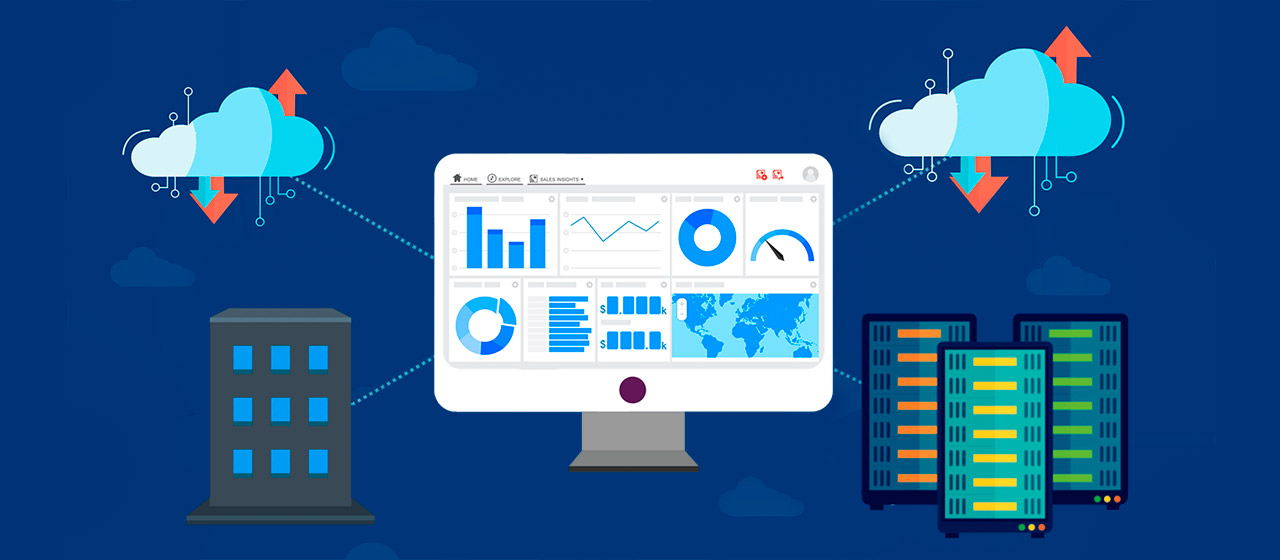At this point in the game, it is almost certain that your company’s commitment to data- driven decision-making is a path of no return.
There is also no doubt that we are in the midst of what we could call the “cloud disruption,” a trend that has come to stay. How does this affect Business Intelligence solutions? Is “cloud BI” the future of data analytics in your organisation? Let’s take a look.
What is Cloud BI?
When we talk about cloud BI, we are referring to the fusion of two concepts: business intelligence, which helps companies extract, process, and analyse their data, and cloud computing.
Therefore, a cloud-based business intelligence solution consists of a data management system focused on analytics, hosted entirely or partially on virtual servers on the Internet.
Cloud services are becoming increasingly popular among organisations of all types and sizes. Some of the advantages you should consider when implementing them in your company include:
Accessibility, Mobility, Convenience
With a cloud solution, you will have access to the information necessary for decision- making at any time and from anywhere, enabling better collaboration, communication, and sharing of criteria among decision-makers.
Additionally, the convenience of being able to access data from any device with an Internet connection—such as mobile phones or tablets—can save you unnecessary trips to the office or remote connections to your servers that often prove uncomfortable in terms of access and speed.
Maximum Adoption in Your Organisation
This ease of access is key to achieving high acceptance of the tool’s use. Just like any application you might have on your smartphone, SaaS (Software as a Service) solutions are easy to use.
Cloud-hosted business intelligence platforms allow for the simple creation and replication of different views based on roles, hierarchy, geography, or teams. User adoption will be greater if you provide them with highly intuitive and interactive analysis dashboards containing key information for their performance and evaluation.
Scalability and Reliability
Generally, providers of this type of SaaS handle all aspects of infrastructure, redundancy, data update capacity, scalability, and platform distribution. At the same time, they provide end-users with a reliable data layer for conducting advanced analyses.
Even if your core business is not in technology, you can scale your cloud application in line with growth while investing time and effort in business expansion.
Additionally, organisations that leverage a cloud BI tool can be assured that they will always have the latest version of the tool thanks to continuous updates and advancements—much more frequently than with most on-premises software.
Security for Your Data and Your Clients’ Data
The security risks of a cloud server are very similar to the threats faced by any server or data center located in your office. Cyber threats such as hacking, malware, or DoS attacks; physical threats like power outages, fires, floods; system failures; or simple human errors can compromise data from any type of server, leading to theft or loss.
The difference lies in the fact that cloud storage and data management providers—such as Google, Amazon, Microsoft, IBM, among others—invest significant resources in incorporating exceptional levels of security into their service offerings through data encryption, anti-malware measures, recovery protocols, and access controls. In fact, security is a vital part of a cloud provider’s service quality—just as important as speed, computing power, or reliability—without which no one would be interested in contracting the service.
Building Analytical Tools with a “Global Vision”
The data in your organisation grows day by day, accumulating in different systems, often without communication between them. Generally, the more data sources there are, the greater the likelihood of silos emerging, which decreases data quality, interdepartmental communication, and consequently, decision-making.
Cloud BI analytical tools are ideal for integrating your organisation’s data for consumption in one place. This makes it much easier to achieve what should be a primary objective of your data management strategy: channeling information from all sources to create a holistic or global view of the organisation, enabling comprehensive analysis shared across the company.
A Matter of Balance
Even with all these advantages, building a data analysis and management system fully hosted in the cloud is not always straightforward. Technical difficulties, organisational inertia, or simply a certain reluctance to place your data in a location that is unknown can influence the decision to move to the cloud.
For this reason, many times the solution involves combining on-premises and cloud systems. For example, it is common for the core information to remain physically hosted
on your office servers while selected and transformed data for analysis is stored externally so that it can be accessed by your clients and employees from anywhere with maximum convenience.
At Kiteris, we offer our knowledge and experience in data management systems and cloud BI to collaboratively build the solution that best fits your analytical needs. – Learn more about Kiteris services.















